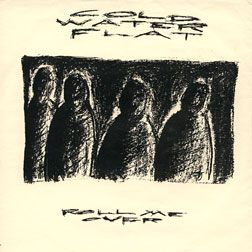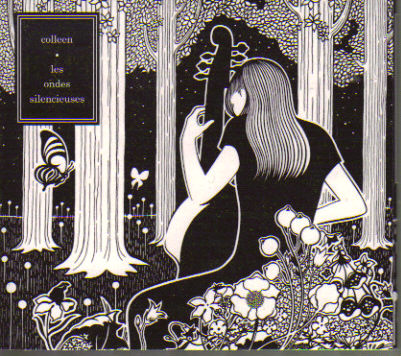
Next is the single 'Yer So Sweet (Baby Donut)' (1995) by riot grrrl supergroup Cold Cold Hearts. It's lively, it's a mess and it's hard to tell if it's brilliant or awful. I suppose the answer lies on how prepared you to accept the astonishing limitations that the riot grrrl movement set itself. Nobody could play but most of the time that didn't really matter because either the intention or the songs (or both) were good enough to carry the day. In the case of Cold Cold Hearts though unfortunately less really was less.

While Bill Janovitz was mining some angst in Buffalo Tom, his brother Paul was doing the same in Cold Water Flat. There are many similarities between the two bands, but Cold Water Flat lack the subtlety and the various stylistic influences of Buffalo Tom. This is straight down the line angst-rock, but it's really a pretty powerful version, mainly down to Janovitz's great way with a vocal melody. First release was the 'Roll Me Over' 7" (1990) which has two great blustery bits of power-chord rock, both of which appear on debut album Listen (1993). Listen has some great songs, but it's a bit overwhelmed by its own tottering sense of gloom and despite having some superb melodies, the underproduction and muddy feel to the whole thing make it hard to discern one song from another. The self-titled second album was preceded by the 'Magnetic North Pole' single (both 1995), which is a great song. The second album is much cleaner, much better produced and Janovitz's songwriter has improved a lot. Although there's still not much variety on offer, the album is, I think, a masterclass in how to construct introspective angst-rock. These are great, gutsy songs and there's never a hint of pomposity about it despite the fact that it's all pretty humourless. I think there could have been a lot more to come from Cold Water Flat but it wasn't to be.




Ah, Rattlesnakes. What a great album Rattlesnakes is. Lovely, lovely stuff. As debut albums go, Lloyd Cole & the Commotions' Rattlesnakes (1984) is astonishingly bold. It's as if they'd been doing this stuff for years and the sheer confidence, the self-possession and self-assurance of the whole thing is truly remarkable, doubly so bearing in mind that they traded in such unaggressive jangly pop music. The folk and soul shapes that sit behind all of the songs only serve as the sketchy traces that the jangle-pop is built over and it's really fascinating to hear such delicate college rock made from such great references. The music, like the lyrics, is terribly smart and while the whole thing should absolutely reek of pretension and condescension, instead it's one of the warmest, most inviting albums of the 80's. Every song is a charm (although I've never really got to grips with fan favourite 'Forest Fire') and the structure is perfect, with ten songs coming in at 36 minutes, just the way an album should be. The edition I've got is one of those "deluxe edition" things which bloats it out to three times the length with tons of added bits of demos, sessions and live tracks, most of which are merely interesting, but it does add seven sketched songs that didn't make the cut or were released as B-sides, most of which are fantastic.

Next up are a few albums by remarkable French musician/composer Cecile Schott who records under the monikor of Colleen. Debut album Everyone Alive Wants Answers (2003) is a beautifully spectral and minimalist piece of post-ambient electronica. It takes all the cues of preceding ambient and completely remoulds them into a series of of wandering, self-replicating pieces which are sometimes creepily sinister, sometimes heart-stoppingly lovely. It's a really rather extraordinary record, especially considering that it hides its unconventionality well. And full marks to any album that has a piece on it entitled 'Long Live Mice in the Metro'. It's beautiful stuff. Better yet is follow-up, The Golden Morning Breaks (2005). Not relishing the prospect of just playing a laptop in live performances of Everyone Alive, Colleen introduced a raft of real instrumentation into The Golden Morning Breaks, mostly arcane and in some cases completely unused instruments. There are glass harmoniums, musical boxes and all sorts of other wilfully complicated musical instruments, but they are used to create an utterly magical post-ambient, post-electronica sound, heralding a completely new approach to how this kind of music can and should be made. The tunes on The Golden Morning are absolutely lovely, there's little of the creeping menace of Everyone Alive here, it's all trascendant, otherworldy beauty.


The next record is slightly less successful, but only by virtue of having a very specific and limiting framework. Colleen et les Boites a Musique (2006) is, as it suggests, literally composed solely of Colleen playing and manipulating the sounds from musical boxes. It's a magical listen, but it does require some patience from the listener as, although it creates hugely different atmospheres from one track to the next, it doesn't vary greatly in terms of the specific sound. And we all know what musical boxes sound like - a bit plinky plonky, a bit trebly, and there's no difference here. It's a wonderful record though and if you can get your head around that sound being the fundamental constituent of the album, it's a dreamy, ethereal listen. The following year Schott decided to adopt another new approach, learning to play the 15th century cello-like Viola da Gamba. Les Ondes Silencieuses (2007) is essentially based on this instrument but it adds all kinds of other things in as well. It's a brooding, deep record, which demands some patience on the part of the listener, but it's also a magnificent demonstration of the fruits of effort. Schott's multi-instrumentalism is startlingly adept and her left-field approach to instrumentation generally means that she creates singularly unique music which seems to come from another time altogether and is absolutely beautiful for that.


Here's yet another of those Broken Social Scene chaps, Jason Collett with his third solo album, Idols of Exile (2005). If you're after some breezy, 70's singer-songwriterly stuff, this is the gear. It's a lovely records, very much in the style of Josh Rouse's early albums, a light touch of Americana country, a little dash of down home folk, but for the most part songs packed full of melody. It's not a superb album by any stretch but it's a charmer and the fact that it eschews a lot of the grandstanding that members of BSS normally can't help themselves but indulge in really stands in its favour. It's relaxed, easy, comfortable in itself and it's a cosy, sunny day type of thing.

Finally it's the mighty Edwyn Collins and his first post-stroke/MRSA nightmare record, Losing Sleep (2010). And it's a real winner. It's a remarkable thing about the man that he has come back so strong, in so many ways from something which would have put a lesser person down. His graceful, beautifully illustrations of birds (a hobby which he concentrated on to recover the use of his hands) which adorn the sleeve show the degree to which he wouldn't be put down, and the songwriting shows the same determination. These songs are as good as any he's written over the years and stands up quite satisfactorily to the superb Orange Juice albums. He's assisted to a great degree by a large and sympathetic bunch of musicians and producers, but nonetheless this is clearly his record, the songwriting is unmistakeable. That delicate edge of northern soul, the scantiest trace of funk and soul, it's all still there underpinning his simple and effective guitar pop/rock. Lyrically it's a fascinating record too, unflinchingly honest about what it's like to nearly lose everything and then to have to work incredibly hard to get any of it back, and again, it's simple but highly effective. It's a great record.

No comments:
Post a Comment